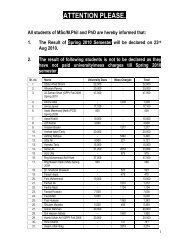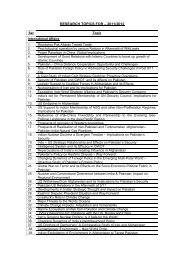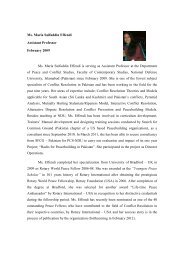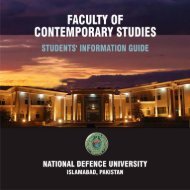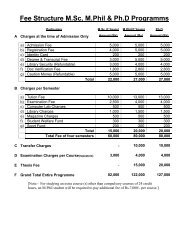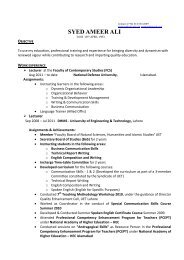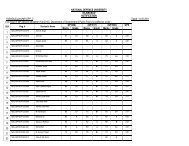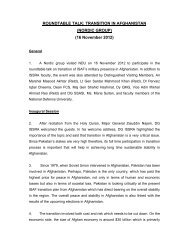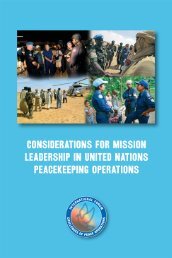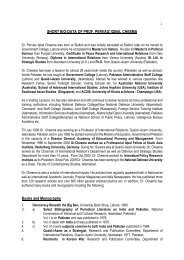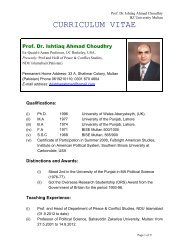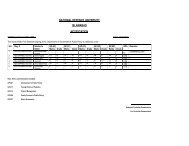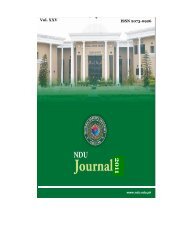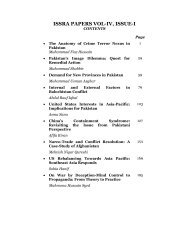OPINION Vol.1, No.1 June 2013 - National Defence University
OPINION Vol.1, No.1 June 2013 - National Defence University
OPINION Vol.1, No.1 June 2013 - National Defence University
Create successful ePaper yourself
Turn your PDF publications into a flip-book with our unique Google optimized e-Paper software.
threaten their security. Coercer credibility of the ability to react on nuclear proliferation was a key<br />
factor.<br />
US Coercion of North Korea<br />
The Issue. Since the Korean War, Democratic Peoples’ Republic of Korea (DPRK) -US relations<br />
have been through several crisis situations. The latest began in October 2002 over the DPRK’s<br />
uranium enrichment programme. The US firmly maintained that the DPRK should not be allowed<br />
to possess nuclear weapons and applied pressure through mechanisms such as the Six Party Talks<br />
(US, North Korea, China, South Korea, Japan, and Russia). However, Pyongyang rebuffed this<br />
coercion and ratcheted up its own coercive diplomacy.<br />
Coercive Diplomacy. After failure of the Six Party Talks, North Korea conducted first nuclear<br />
weapon test in October 2005. Coercive diplomacy was then ratcheted up. The UNSC imposed<br />
economic sanctions and threatened further measures. The strategy seemed to have some effect, as<br />
North Korea announced a return to the six-party talks.<br />
Proportionality. The coercer’s demands were too high: they were against the vital interests of<br />
the adversary, so the asymmetry of interests favoured the adversary, making it more likely to<br />
resist 12 . Both the US and North Korea had certain irreducible objectives, which caused them to<br />
stick to their stated positions. The Bush Administration’s demands had unclear settlement<br />
conditions because the US, chastened by North Korea’s secret nuclear programme, refused to<br />
discuss concessions until its nuclear weapons programme was dismantled. The regime-change<br />
agenda went beyond the fundamental interests of the US, making Pyongyang’s resolve stronger<br />
and the American threat credibility weaker.<br />
Reciprocity. North Korea declared the US/ UN imposed economic sanctions as an act of war 13 .<br />
However, the US declined to ease sanctions unless the nuclear programme was abandoned. North<br />
Korea demanded direct bilateral talks, which the US thought too much of a concession. North<br />
Korea offered some concessions in the October 2002 talks 14 , but these were not up to minimum US<br />
demands.<br />
Coercer’s Credibility. Nuclear weapons, especially the deterrence capability, enable reverse<br />
coercion, i.e. by the target state on the coercer. Pyongyang had much less to lose than members of<br />
the US alliance in the region (South Korea, Japan and large number of American troops).<br />
Coercion in the context of nuclear weapons reduced US coercive credibility.<br />
Coercion of Iran<br />
The Issue. Relations between the US and Islamic Republic of Iran have remained thorny since<br />
the latter’s formation in 1979. Iran’s avoidance of nuclear inspections has aggravated the tension.<br />
Consequently, President Bush called Iran a member of the “Axis of Evil” 15 in 2002 and applied<br />
coercive statecraft.<br />
Coercive Diplomacy. The US adopted a two-track policy. On one hand, coercive diplomacy of<br />
economic and trade sanctions, Stuxnet 16 , threats of military strikes and attacks on its nuclear<br />
scientists, on the other, diplomatic engagement offering incentives.<br />
Reciprocity. US coercion remains unsuccessful due to its failure to organize a focused and<br />
multifaceted programme. Iran signed the Non-Proliferation Treaty (NPT) in 1970, whereby nonnuclear<br />
signatory states agreed to remain non-nuclear weapon states provided they got support in<br />
establishing civilian nuclear programmes 17 . Iran claimed to be pursuing Uranium enrichment for<br />
peaceful purposes. However, demanding ‘no enrichment at all’ seems excessive and illegitimate 18 .<br />
Multilateral UNSC sanctions were, therefore, not supported by Russia and China. Demanding<br />
Iran's complete capitulation without relief from sanctions is a maximalist position, with less<br />
chance of success 19 .<br />
Coercer’s Credibility. Unilateral economic sanctions do not sufficiently threaten Iran 20 .<br />
Military strikes, due to the secrecy of nuclear facilities, would be disproportionate and therefore<br />
not credible. Military action by the USA would destabilize the region against US interests.<br />
<strong>OPINION</strong> <strong>Vol.1</strong> <strong>No.1</strong> 26 <strong>June</strong> <strong>2013</strong>



